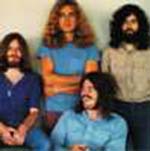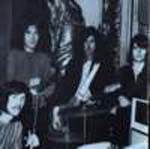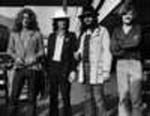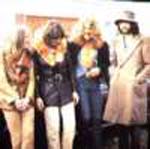 The news that Jimmy Page was forming a band spread rather quickly in the musical world, and before long he received word from John Paul Jones. Jones, like Page had been, was a session guitarist looking for something better to get into (Page's band was just that thing). Page, knowing Jones' abilities, was also very enthusiastic about getting Jones.
The news that Jimmy Page was forming a band spread rather quickly in the musical world, and before long he received word from John Paul Jones. Jones, like Page had been, was a session guitarist looking for something better to get into (Page's band was just that thing). Page, knowing Jones' abilities, was also very enthusiastic about getting Jones.
Their first choices for lead vocal and drummer were Terry Reid from Peter Jay and The Jaywalkers, and B.J. Wilson from Procol Harum respectively. But as it turned out, neither of them were available, however, Reid did recommend someone else for lead vocal. That someone else was Robert Plant, a young vocalist who had recently been in London looking for work. So Page and Peter Grant (the bands to be manager) traveled to Birmingham to see Plant play. Page and Grant were adequately impressed and soon Plant was on board with the band as well.
The next part of the band, the drummer, turned out to be more of a challenge than they had anticipated. Plant had recommended that they take a look at John Bonham, a drummer whom he had played with before. Unfortunately he was presently on tour with Tim Rose which made it very hard for them to track him down. When they finally did find him it turned out that they weren't the only ones trying to get the drummer. Bonham had also just received offers from Chris Farlowe and Joe Cocker. Fortunately for Page, Plant, and Jones, Bonham decided that he liked the sound that he would have with them and enjoy playing with them more that with the other two. So he went with Page, Plant, and Jones.
 As it tuned out though, getting a hold of Bonham to get him to the first rehearsal would prove almost as hard getting to him in the first place. Since Bonham had no phone Grant was forced to send him telegrams to tell him to come. In the end it took around 40 telegrams before he could be reached to begin work. When he finally got there, they began rehearsing at Page's London flat and worked on a number of different songs including "The Train Kept A 'Rollin'" (an old Yardbirds tune), which is reputed to be the first song they ever played together.
As it tuned out though, getting a hold of Bonham to get him to the first rehearsal would prove almost as hard getting to him in the first place. Since Bonham had no phone Grant was forced to send him telegrams to tell him to come. In the end it took around 40 telegrams before he could be reached to begin work. When he finally got there, they began rehearsing at Page's London flat and worked on a number of different songs including "The Train Kept A 'Rollin'" (an old Yardbirds tune), which is reputed to be the first song they ever played together.
As Jimmy Page remembers it the sound was great from the start. Which was just as well because they had their first gig in Copenhagen in just three weeks to kick-off a ten-day Scandinavian tour. These firs few gigs were not done under the name of Led Zeppelin however (even thought the name had already been decided). They were done as the New Yardbirds because of old contractual agreements. Interestingly enough, the name of Led Zeppelin wasn't even coined by a member of the band, but by Keith Moon of the Who had given it to them after coming up with it as an idea for a band he was possibly going to start. Also, it was originally spelled Lead not Led, but it was changed when Peter Grant realized people might mispronounce it so he shortened it.
 Immediately after the conclusion of the band's Scandinavian tour they went right to the studio to record their first album. They successfully recorded the album in a mere 30 hours and spent only 1,782 pounds on it (including the cover). By 1975 the album had grossed 3.5 million pounds - quite a sum of money for only 30 hours of work.
Immediately after the conclusion of the band's Scandinavian tour they went right to the studio to record their first album. They successfully recorded the album in a mere 30 hours and spent only 1,782 pounds on it (including the cover). By 1975 the album had grossed 3.5 million pounds - quite a sum of money for only 30 hours of work.
Even while all this was going on Page was still doing some sessions. Including a session with Al Stewart ("Love Chronicles") and one with Joe Cocker ("With a Little Help From My Friends"). At the time these sessions were necessary because Page was subsidizing the other members of the band. However this spare time wouldn't last much longer because they would be getting much busier.
Peter Grant, as the manager, was responsible for securing the band a worldwide record deal, so between gigs he went to New York with live tapes, album tapes, and other examples of the group's playing. In an odd twist Grant went not to Epic (a subsidiary of Columbia who had rights to the Yardbirds in the US), but to Atlantic for this deal. This was quite astonishing to Clive Davis (president of Columbia) who allegedly went berserk upon the news which was given to him at the end of a long meeting with Grant and Zeppelin's attorney.
 The resulting five-year contract with Atlantic has been rumored to have included a $200,000 advance. This was more than any other band had received to date, and was even more astonishing because Atlantic hadn't even seen them yet. Grant was also able to negotiate an astonishing amount of freedom for his new group. They were responsible for essentially everything including production and publicity. Not that they weren't aptly equipped though; Grant had set up producing and publishing companies a few weeks earlier. This turned out to be very important because it also meant they were more able to be sure they made what they deserved. They knew that by being in charge of almost everything and having a trustworthy manager in Peter Grant would keep them from getting screwed out of money like many other bands had in the past.
The resulting five-year contract with Atlantic has been rumored to have included a $200,000 advance. This was more than any other band had received to date, and was even more astonishing because Atlantic hadn't even seen them yet. Grant was also able to negotiate an astonishing amount of freedom for his new group. They were responsible for essentially everything including production and publicity. Not that they weren't aptly equipped though; Grant had set up producing and publishing companies a few weeks earlier. This turned out to be very important because it also meant they were more able to be sure they made what they deserved. They knew that by being in charge of almost everything and having a trustworthy manager in Peter Grant would keep them from getting screwed out of money like many other bands had in the past.
Unfortunately for the new group, Britain wanted nothing to do with anything totaly new. As the New Yardbirds they were ok, but as Led Zeppelin they almost become a joke in Britain. So they decided to give it a go in America. They debuted in the U.S. on December 26, 1968 in Denver, Colorado. This first American tour was designed by Premier Talent (the best at the time) and meant to accomplish the most in the least amount of time. The tour was able to do this even better with the experience of Peter Grant, who had a good idea of where gigs would be best for promotion of the band. Special attention was applied to the West Coast dates because of the Yardbirds' strong following there.
 Jimmy Page recalls when he thought the group had broken through, "I can tell you when we'd broken through...San Francisco. There were other gigs, like the Boston Tea Party and the Kinetic Circus in Chicago, which have unfortunately disappeared as venues, where the response was so incredible we knew we'd made our impression. But after the San Francisco gig it was just--Bang!" From then on Led Zeppelin continued to move up and soon they became one of the greatest bands ever.
Jimmy Page recalls when he thought the group had broken through, "I can tell you when we'd broken through...San Francisco. There were other gigs, like the Boston Tea Party and the Kinetic Circus in Chicago, which have unfortunately disappeared as venues, where the response was so incredible we knew we'd made our impression. But after the San Francisco gig it was just--Bang!" From then on Led Zeppelin continued to move up and soon they became one of the greatest bands ever.
That is the legacy of Led Zeppelin!
